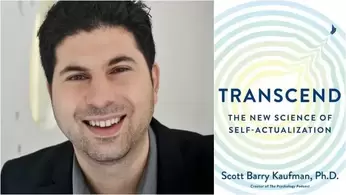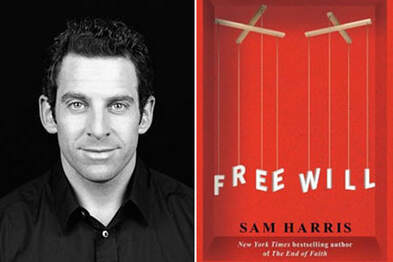So, what prompted Sam to speak out about free will now? Well, I think the real reason Sam posted his thoughts when he did was because it was fresh on the heels of a 3-hour discussion he had with Scott Barry Kaufman on The Psychology Podcast. Scott published his amazing book Transcend last year, which has the sub-title "The New Science of Self-Actualization". In other words, having a self that is free to be actualized is kind of an essential part of Scott's project. But Sam is famous for denying these things in his work, including his 2012 book Free Will.
Since I'm deeply immersed in the topic of free will right now, I thought I'd spend a few posts on these recent discussions. I'll get to Sam's "final thoughts" in a few posts, but first, let's take a closer look at Part 1 of Sam's conversation with Scott, which was posted on February 25th. Next time, I'll delve into Part 2, which was posted on March 4th. I won't bother transcribing all three hours of these free podcasts, so please listen to them for yourself for the full story. But here are some important bits that I'd like to comment on.
- Sam: When I was in college, a girlfriend broke up with me and I just became this machine that was producing unhappiness until an MDMA experience showed me that that could be interrupted with no reason attached.
Sam has become a strong proponent of psychedelic drug use after this early experience kicked off his life as a contemplative and public intellectual focusing on consciousness and free will. I haven't used such drugs myself personally, but as a 49-year-old-man now, I have to say that every time Sam talks about the important lessons he got from the experience, I think I've already learned those lessons from other experiences. (Notably, in grand nature spots, but also while studying astronomy, geology, and deep evolutionary history.) Could I have learned these lessons earlier in my life on a drug trip? Maybe. But I tend to agree with Abraham Maslow who thought such experiences were cheating to try to get to self-actualization. Better to have reasons for your emotions and learn from those.
- [Sam] studied for years with the leading Buddhist meditation thinkers. There are dualistic vs. non-dualistic forms of awareness meditation, with different sets of instructions for each one as to what to pay attention to and why. With these exercises, you aren’t meditating yourself into perfection; you are just learning to recognize something that is already there.
I've not been on any lengthy retreats yet, but I have done a fair bit of reading about meditation, and I have practiced it on my own for nearly 20 years now with the help of many guided meditation sessions along the way (including lots from Sam's Waking Up app). Meditating has been a good and useful experience in my life, but, a bit like using psychedelics, I think it's an artificial experience that doesn't have quite the relevance to everyday life that Sam thinks it does. I'll say more about that in the next post, but I wanted to flag that I have meditated and enjoyed it.
- Scott: I want to read a sentence you wrote because I have issues and questions with it “Consider what it would actually take to have free will. You would need to be aware of all the factors that determine your thoughts and actions and you would need to be in complete control of these factors.” This sentence reads like you are an implicit dualist. Who is the “you” in that sentence?
This is a great observation that I also notice whenever I read or listen to Sam. He continually toggles back and forth between his cold declarations about the lack of a self or free will and then his hot instructions about what "you" need to do or notice about "your consciousness and its contents". In Dan Dennett's review of Free Will, Dan pointed this out too. He noted a sentence on p9 that said "I, as the conscious witness of my experience, no more initiate events in my prefrontal cortex than I cause my heart to beat." Dan said, "If this isn't pure Cartesianism, I don't know what it is. His prefrontal cortex is part of the I in question." That's exactly right. Consciousness is embodied and should not be spoken of so separately as Sam is wont to do.
What does Sam say about this sentence when Scott asks him how to understand it? He shifts into Zen Koan mode.
- Sam: Yeah. It’s not really understandable in that way. What you’ve really just landed on is the problem with the concept of free will. It’s an incoherent idea. ... As you know, Dan Dennett has tried to purify the concept so as to have in his terms a “free will worth wanting”. ... [But] you’re not acknowledging just how many important things shift ethically once you let go of that spooky free will. Things really do change. And they change in ways that are important not just for our justice system and our concept of justice, they are important for ethical intuitions about what it means to be a good person and how we should feel in the presence of all the misadventures we have in life...and Dan Dennett’s project acknowledges none of that. That’s why he and I have never agreed on this topic.
This is an incredibly disingenuous reading of Dan's work and his previous exchanges with Sam. If anything, it's the other way around as Sam has not done the hard work of trying to really see what goes away when the concept of free will disappears. As one example, Dan noted in is review of Free Will that "entirely missing from Harris's account...is any acknowledgement of the morally important difference between...the raving psychopath and us." Perhaps this is why Dan has just moved on to debate Gregg Caruso instead, since he's actually a serious thinker who has tried to develop a Public Health Quarantine Model to replace our current retributive justice system. Poking at the holes in Caruso's model took up a significant portion of Just Deserts. Sam doesn't even have a model to poke at. And it's not just psychopaths he doesn't see as any different than the rest of us.
- Sam: The rules, ethically and psychologically, seem to change entirely for people, when you are talking about [other] people. They don’t think this way about chimpanzees. They don’t think this way about people with certain kinds of brain damage. ...The problem is that it doesn’t make any sense. ... It’s very difficult to make sense of this in terms of the streams of causality that I’m not aware of, in terms of gene transcription, and neurotransmitter behaviour, and all of the causes reaching back to the Big Bang that I didn’t author.
I'll point this out again in the next post, but the way Sam speaks about humans is literally dehumanising. In case it's not obvious how dangerous that is, David Livingstone Smith has done excellent work on the subject. (See this book review by Smith for some examples of Nazi dehumanisation.) I get that Sam is merely recognising here that the "folk" have different intuitions about people compared to their intuitions about chimpanzees and brain damaged people, but by saying this doesn't make sense, he is opening up the door to some very bad attitudes.
- Scott: You are really hung up on the magical part of free will.
- Sam: It’s not hung up! It is what people mean when they feel that someone should be punished, really punished, because they deserve their punishment. That is “just deserts.” That is someone who feels that the logic of retribution is anchored to libertarian free will.
It's sad to hear that Sam is still stuck repeating these points even though Dan Dennett took them apart several years ago. In his review of Free Will, Dan noted that Sam said, "However, the 'free will' that compatibilists defend is not the free will that most people feel they have" (p16). But Dan countered, "First of all, he doesn't know this. [And experimental philosophy suggests he's wrong.] But even if it is true, maybe all this shows is that most people are suffering from a sort of illusion that could be replaced by wisdom. After all, most people used to believe the sun went around the earth. They were wrong, and it took some heavy lifting to convince them of this." And in Just Deserts, Dan and Gregg do lots of this kind of lifting. Both agree there are reasons to get rid of retribution and libertarian free will, and you can do so as a free will skeptic (Gregg's project) or as a compatibilist (Dan's project).
- Scott: It seems like people can do all the things they care about. If they think they care about making choices that are somehow uncaused, they just aren’t literally understanding what that means, as you point out. What people really mean when they insist that free will is important is they don’t want to feel coerced. They think of causes as sources of coercion, but that’s a confusion. I think people want to make choices that are consistent with their own goals and be able to deliberate about the causes where their desires aren’t totally clear, and they can do those things. And it’s pretty clear their consciousness participates causally in that process.
- Sam: I would dispute that. ... For much of what we seem to do consciously, it remains mysterious why consciousness need be associated with any of these things. We can imagine building robots that could pass the Turing test that could do all of these things without there being something that it is like to be those robots.
Ah, now we're getting to another root problem with Sam's view of the world. I think that all his meditation training focused on "consciousness and its contents" has left him with his dualist language and a fundamental misunderstanding of what consciousness is. I've spent the past year looking at the definitions and studies of consciousness (summarised here) and found it requires a much more nuanced understanding of how consciousness emerges to varying degrees via a hierarchy of activities. Along the way, there is clear evidence that conscious awareness is required for certain types of learning. (This kind of awareness is possibly what Sam means by "consciousness" but that's not at all clear considering his dabbling in panpsychism.) Also, Dan Dennett's paper on The Unimagined Preposterousness of Zombies shows just how unimaginable Sam's robots really are.
- Scott: Of course we are just our biology. What else would we be? But isn’t it the point that our biology encompasses all the interesting stuff that we are? You could still say that it means something for the robot to be a unique robot. But don’t you think that the interesting thing is that the biology encompasses all the unique aspects of what Sam Harris is and who Sam Harris is, including your unconsciousness and your consciousness?
- Sam: Hmmm. I’m trying to think of how to make this point land…
- <<< ROLL PODCAST CREDITS >>>
Wow, what a cliffhanger ending! I shouted, "Yes!" to Scott's question, but let's see what Sam says next time.



